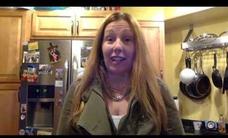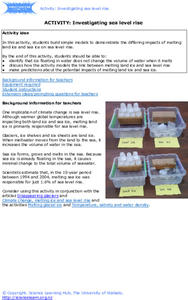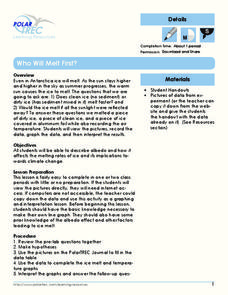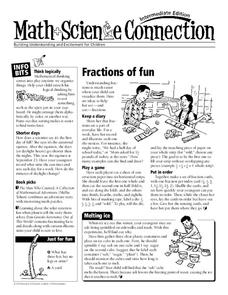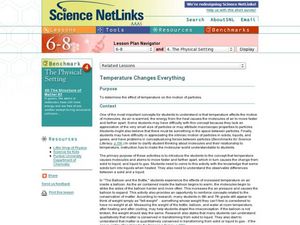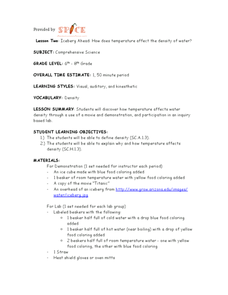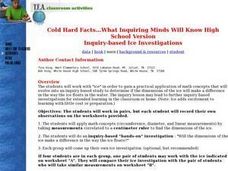Curated OER
Properties of Matter
This PowerPoint is a gem! Seventy-eight slides present an entire introduction to matter in bullet-point fashion. Viewers learn about everything from mass and inertia to phase changes and gas laws! The only glitch is that the links to...
DiscoverE
At Home: Keep a Cube Activity
Let cooler heads prevail. Future engineers first learn about heat transfer and insulation. They then design and build a contraption that will prevent an ice cube from melting for as long as possible.
University of Waikato
Investigating Sea Level Rise
Find an explanation for the sea level rise. Pupils investigate the difference that melting land ice and sea ice have on the sea level. Groups create two models—one with ice on land and one with ice in the water. As the ice melts, teams...
Discovery Education
Smoke on the Water
How do clouds form? Learners demonstrate the formation of clouds and the water cycle by testing four different setups in a plastic bottle. They identify the key components of a cloud to help them understand the process of cloud...
Colorado State University
Why Are Clouds White?
Is it possible to change the color of clouds? A three-part activity explores the scattering of light by the water droplets that make up clouds. After observing a demonstration, curious scholars conduct their own investigations of the...
Beyond Benign
The Big Melt: Arctic Ice Caps
Are the Arctic ice caps really melting out of existence? Junior climatologists examine the statistics of ice decline through four math-based lessons. Each activity incorporates data, climate information, and environmental impact into an...
US Geological Survey
The Water Cycle — A Placemat for Kids
What better time to reinforce a concept than when you're eating? Boost scholars' knowledge of the water cycle with an eye-catching placemat featuring playful raindrops and bright colors.
Polar Trec
Who Will Melt First?
If the Greenland ice sheet melted, sea levels would rise by about 20 ft; if the Antarctic ice sheet melted, sea levels would rise by 200 ft. Scholars explore ice melting through the analysis of different ice samples, clean and dirty ice....
University of Chicago
Don't Be Too Flaky
Snow, ice, and water are all composed of H2O. Does that mean they all have the same volume? Discover the ways that the densities of these substances determine their volumes, and how they change based on their current states of matter....
Resources for Educators
Fractions of Fun
Reinforce concepts and encourage learner engagement with a collection of math games, science experiments, and cross curricular activities. In one fun resource, learners sort objects, keep a diary of everyday fractions, play a game using...
Curated OER
Scientific Method Experiment: Factors Affecting How Ice Melts
Students demonstrate the scientific method by conducting an ice cube melting experiment. They make predictions and observations, and conclude what factors make ice melt more slowly or quickly than normal.
Curated OER
Melting the Ice: Energy Transfer
Students study thermal energy and energy transfer to sea ice processes. In this energy transfer instructional activity, students make their own ice cream and discuss energy transfer and thermal energy. Students view a radiation overhead...
Curated OER
Volcanoes!: The Dangers of Snow and Ice
Students observe a demonstration of how melting snow and ice can contribute to mudflows. They then observea list of continents with the number of snow and ice covered mountains on each continent and discuss. They then label a group of...
Curated OER
Water and Ice
Students explore water and ice. In this physical science lesson, students participate in a science inquiry and observe the characteristics of ice and water. Students compare the differences between a solid and liquid and record their...
Curated OER
Temperature Changes Everything
Middle school chemists visit interactive websites in order to discover what happens to molecular motion when heat is added to matter. They conduct an experiment that demonstrates the expansion of matter with the addition of heat. A lab...
Curated OER
Putting the Ice in Hockey
Eighth grade physical science classes examine why the ice on which hockey is played is slippery. They do so by discussing phases of matter and the molecular motion in each. They read an article on a website and write out answers to 10...
Curated OER
How Does the Earth's Energy Budget Relate to Polar Ice?
Students use satellite data to see how radiation budget relates to the ice that is present in the North. In this energy lesson plan students correlate data to see a relationship.
Curated OER
Iceberg Ahead: How Does Temperature Affect the Density of Water?
Demonstrate how ice floats on water and get the class thinking about why icebergs are so deceiving. Investigators then experiment with mixing water of the same temperature and water of different temperatures. Make sure to explain the...
Curated OER
Science Jeopardy - The Earth Sciences
The earth sciences are the focus for this Jeopardy-style review game. Categories include geology, space, scientific investigation, meteorology, and oceanography. Diagrams and pictures are involved with most of the questions, making this...
Curated OER
Water and Ice
Students explore water and how it changes forms. In this investigative lesson students participate in an activity that shows them how water changes form and what it looks and feels like.
Curated OER
Ice
Learners examine the different propereties of ice, such as freezing temperature. In this scientific lesson students complete several activities using ice, like making ice cream.
Curated OER
Water and Ice
Students make observations of ice as it melts. In this phase change lesson, students observe ice as it melts in a cup. They discuss their observations and place the cup of water into a freezer to change it back into ice.
Curated OER
I is for Ice
In this handwriting learning exercise, learners trace and practice writing the letter 'I' in upper and lower case forms. They also trace and write the word "ice" on the lines provided and describe its meaning as shown in the picture
Curated OER
Cold Hard Facts...What Inquiring Minds Will Know
Students work with "ice" in order to gain a practical application of math concepts that evolve into an inquiry-based study. They determine if the dimensions of the ice make a difference in the way the ice floats in the water.



